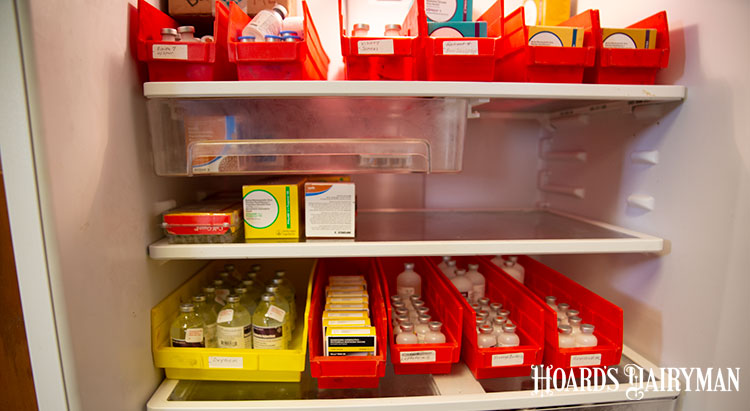
In a University of Minnesota Extension “The Moos Room” podcast, Armstrong recommended to first make sure that the refrigerator used to store cattle health products is in working order. He pointed out that a barn refrigerator usually started its useful life somewhere else.
“If it wasn’t good enough to store food anymore, why is it good enough to store thousands of dollars’ worth of product?” he asked. “Just be careful when you take it out of the house; make sure it is working.”
Put a thermometer in the refrigerator to confirm it is cooling properly, and Armstrong said to check in several spots, as there can be variation within the refrigerator.
When looking through stored vaccines, Armstrong said to carefully review expiration dates. If a product is coming up on its expiration date, he said to discuss with the manufacturer or your veterinarian to see if it can be replaced. He reminded the audience that vaccines are not effective past their due date.
Whether in the refrigerator or a cabinet, he said lactating and nonlactating drugs should be stored on separate shelves. They should also be labeled clearly. Products intended specifically for calves should also be stored in a separate area, if possible.
Armstrong shared that for many antibiotics, once the seal is broken, it should be used within 28 days. A helpful hint is to write the date of opening on the bottle. He said to consult with the product manufacturer or your vet to determine how to best store and save these products.
If there’s any doubt on how long the bottle has been opened, if it’s been contaminated, or about the effectiveness of the product, Armstrong encouraged producers to throw it out and replace it. He said horrible reactions can occur in animals that are treated with contaminated products.
He said to never store bottles with syringes in them, as that is a major contamination hazard. Also, if a bottle top is wearing out, replace it.
It is also important to check the labeling of all products. Armstrong said the name and address of the prescribing veterinarian needs to be on all prescription products, as well as the directions for use, withdrawal times for milk or meat, any necessary safety statements, and the active ingredient. “All of this has to be on the label in some way,” he emphasized.
This pertains to antibiotics that are prescribed for use in an extra label way as well. If these details are not on a label, he said to discuss it with your veterinarian so they can help fix the problem.
Finally, he said to make sure to clean needles and syringes regularly. This includes reusable syringes. “They are very convenient and nice to have around, but they do need to be cleaned so they continue to work correctly and don’t have build up or cause cross contamination,” he noted.








